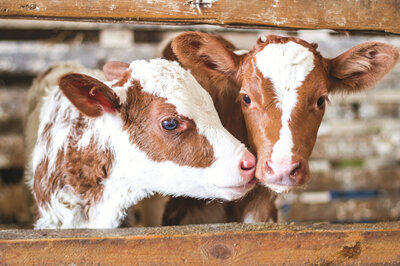
Calf scours may result in the need for intensive treatments. Losses can be significant and recovered animals can have reduced lifetime production.
Bacteria, viruses, protozoa, and nutritional factors can all cause scours in newborn calves.
These include:
Rotavirus - A viral disease causing severe scours with infection levels up to 100%, and high death rates in some cases. The virus can be transmitted from cows to their calves at birth, and with a short incubation period, calves as young as 1 – 4 days can be affected.
Coronavirus - A viral disease affecting calves at 5 – 20 days of age, with infection rates of 15 -20%.
Escherichia coli - A bacterial disease affecting very young calves. E.coli infections usually result in sudden death
Salmonella - A bacterial disease affecting calves of any age. Salmonella is characterized by blood-stained faeces, medium to high infection levels and deaths. Salmonella can be transmitted directly to humans.
Cryptosporidiosis - A protozoal disease characterized by high infection rates and deaths. Cryptosporidiosis affects calves as young as four days old, but can be present up to 4 weeks or older.
Coccidiosis - A protozoal disease affecting calves 3 – 4 weeks of age and possibly up to post-weaning.
Nutritional - Non-infectious scours caused by nutritional factors, such as poor quality milk replacers, or sudden changes in diet.
Diagnosis is Important
Because there are many causes of neonatal scours, with potentially different treatments, it is important that we confirm the diagnosis as soon as possible after you notice diarrhoea.
A veterinary visit is recommended early in the outbreak. Apart from examination of the calves ,Post -mortem examinations and faecal collection, this is also an opportunity to take blood samples to measure the adequacy of colostrum feeding, and to discuss facilities and management.
Symptoms, Treatment, and Prevention
Symptoms vary from mild diarrhoea to severe watery diarrhoea with blood present.
Calves may be depressed, dehydrated, unable to suckle, and in severe cases will become recumbent. You may also notice bloated stomachs and teeth grinding (which indicates gut pain).
Once calves are unable to stand they will require veterinary intervention.
Treatment of neonatal diarrhoea involves adequate fluid, electrolyte and energy replacement for sufficient periods to allow the animal to recover. Fluids can be given orally if the calves are standing, but if they lie down and become excessively dehydrated intravenous fluids will be required to be given by a vet. The way you feed electrolytes and milk is important and you should discuss this with your vet.
In most cases calves will recover well, but some may require antibiotic treatments in addition to fluids. If Cryptosporidiosis or Coccidiosis is diagnosed specific antiprotozoal drugs may be required. There are other supportive products available which should be discussed with your vet.
Preventing calf scours involves an integrated approach which includes cow vaccination prior to calving, excellent colostrum and milk feeding management, calf pen and feeding utensil hygiene, low risk bedding, lower stocking rates, and minimizing draughts.
Neonatal diarrhoea has significant costs resulting from treatments, deaths, and reduced live weight gains. Following recovery from diarrhoea, calves will require extra milk and concentrates to achieve weaning weights and will have reduced live weight gains from weaning to mating which will have an effect on first service conception rates.
Calves affected by neonatal diarrhoea are commonly below live weight targets for life which affects their lifetime production and reproduction. The costs associated with rectifying these reductions in growth, production and reproduction can be very significant.